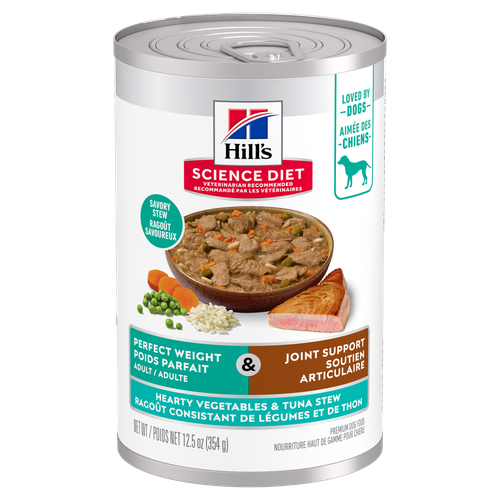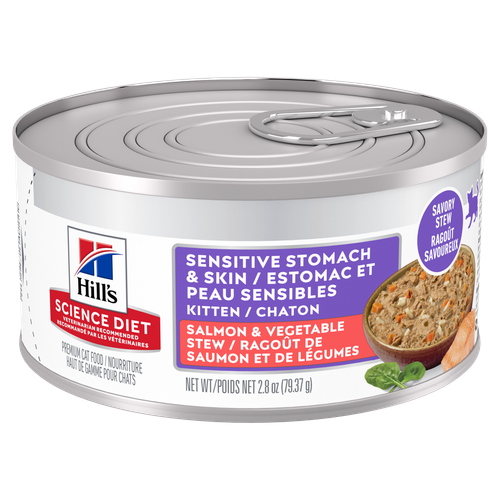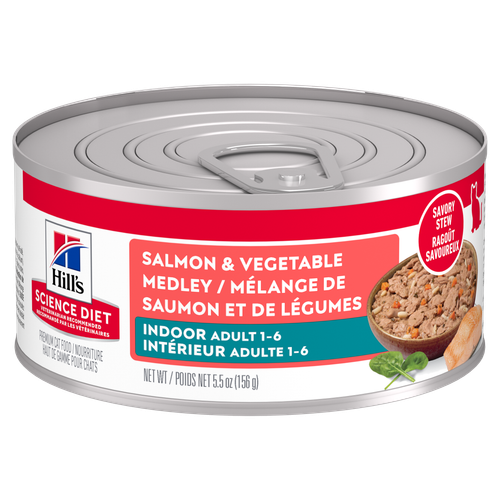
-
Find the right food for your petTake this quiz to see which food may be the best for your furry friend.Find the right food for your petTake this quiz to see which food may be the best for your furry friend.Featured products
 Sensitive Stomach & Skin, assortiment de conserves
Sensitive Stomach & Skin, assortiment de conservesHill's Science Diet Sensitive Stomach & Skin Variety Pack
Shop Now Healthy Cuisine, Adulte, assortiment de conserves
Healthy Cuisine, Adulte, assortiment de conservesHill's Science Diet Healthy Cuisine Variety Pack
Shop Now Adult Perfect Weight & Joint Support Hearty Vegetables and Tuna Stew Dog FoodShop NowFeatured products
Adult Perfect Weight & Joint Support Hearty Vegetables and Tuna Stew Dog FoodShop NowFeatured products Adult Urinary Hairball Control Savory Chicken Entrée cat food
Adult Urinary Hairball Control Savory Chicken Entrée cat foodSupports the health of the whole urinary system with optimal levels of magnesium
Shop Now Kitten Sensitive Stomach & Skin Salmon & Vegetable Stew
Kitten Sensitive Stomach & Skin Salmon & Vegetable StewSupports kitten growth, digestive health, nourishes skin and promotes a lustrous fur
Shop Now Adult Indoor Salmon & Vegetable Medley Cat Food
Adult Indoor Salmon & Vegetable Medley Cat FoodPrecisely balanced nutrition for indoor cats with the delicious taste of savory salmon and vegetables
Shop Now -
Dog
- Dog Tips & Articles
-
Health Category
- Weight
- Food & Environmental Sensitivities
- Urinary
- Digestive
- Joint
- Kidney
- Dental
- Cancer
-
Life Stage
- Puppy Nutrition
- Adult Nutrition
- Senior Nutrition
Cat- Cat Tips & Articles
-
Health Category
- Weight
- Skin & Food Sensitivities
- Urinary
- Digestive
- Kidney
- Dental
- Stress
- Cancer
-
Life Stage
- Kitten Nutrition
- Adult Nutrition
Featured articles Pet Food Storage Tips
Pet Food Storage TipsDiscover how and where to store your dry, as well as canned, dog and cat food. Learn how to find the "best before" dates on all Hill's pet food packaging.
Read More The Incredible Science Behind Your Pet's Microbiome
The Incredible Science Behind Your Pet's MicrobiomeLearn what a pet's microbiome is, how it contributes to your pet's gut & overall health, and why nutrition is important in maintaining healthy microbiomes.
Read More Compare Your Pet Food's Calories to Other Brands
Compare Your Pet Food's Calories to Other BrandsCompare Hill's Science Diet dog and cat food's calories against other pet food brands and AAFCO recommended maximum calorie count.
Read More -


What causes skin conditions?
Your veterinarian may recommend tests to identify the exact reason for your cat’s skin condition. Common causes include:
Allergies: Your cat may be allergic (or intolerant) to either cat food or environmental factors like dust, pollen or mold.
Parasites: Fleas, lice and mites can all cause mild to severe skin irritation.
Hormonal Imbalances: Cats with too much or too little of certain hormones are prone to skin problems.
Infections: Bacterial infections can cause skin problems.
Does my cat have a skin condition?
Your cat’s skin should be smooth and soft with no flaking, redness or signs of irritation. It should be neither too dry nor too oily and have no areas of hair loss. Signs of skin disease include the following:
- Red patches, spots or pimples
- Scabs, crusts or thickened skin
- Hair loss
- Flaky or scaly patches
- Bad skin odor
- Itching, scratching, licking or rubbing

IMPORTANT: Skin discomfort can have many causes. If your cat is showing signs of irritation, consult your veterinarian who will be able to diagnose the condition.
How can the right cat food help?
Some skin conditions can be cleared up quickly, while others need lifelong management. The good news is, most cats with skin conditions can be helped if you feed the right cat food, even if the cause of the condition is not nutritional. Please speak with your veterinarian about the appropriate cat food recommendation.
Some important nutrients that can help heal and protect your cat’s skin include:
Protein: High-quality protein provides the building blocks to repair damaged skin. Feeding unique protein sources, such as venison or duck, can also help reduce reaction in cats with a food allergy or intolerances to more common ingredients.
Essential Fatty Acids: A cat food containing high levels of omega-3 and omega-6 fatty acids, found naturally in fish oil, will help nourish and protect your cat’s skin, prevent dryness and help control inflammation.
Antioxidants: Vitamin E and other antioxidants are vital in helping to maintain your cat’s healthy immune system, and protect it from cellular oxidation caused by free radicals.
Combining these nutrients in a single cat food provides a convenient way to manage your cat's skin condition.
The importance of nutrition
The food your cat eats plays an important role in her overall health and well-being. Balanced nutrition is an essential part of an active, healthy lifestyle. When your cat has a skin condition, it’s even more important to feed the right cat food.
For accurate diagnosis and treatment options, always consult your veterinarian and ask them to recommend the best food for your cat’s skin condition.
Ask Your Veterinarian About your Cat’s Skin Health:
- How do I know if adverse reactions to foods are causing my cat to lick and scratch?
- What causes adverse reactions to foods?
- What are the different treatment options available?
- How does food affect my cat’s adverse reactions to foods?
- What is a novel protein food?
- How can fatty acids in cat food help?
- What are the different cat food options available for cats with adverse reactions to foods and skin issues?
- Is it okay to supplement my cat’s dry food with canned food and treats?
- Would you recommend a Hill’s™ Prescription Diet™ cat food for my cat’s skin issues?
- Ask about special nutritional concerns for your cat
- How much / how often you should feed the recommended food to your cat
- What kind of cat treats can I feed my cat to avoid adverse reactions to food?
- Can you provide me with written instructions or a booklet for skin conditions for my cat?
- What is the best way (email/phone) to reach you or your hospital if I have questions?
- Ask if you need a follow-up appointment.
- Ask if a reminder email or notice will be sent.


Tasty Tips
Does my cat have a skin condition?
Your cat’s skin should be smooth and soft with no flaking, redness or signs of irritation. It should be neither too dry nor too oily and have no areas of hair loss. Signs of skin disease include the following:
- Red patches, spots or pimples
- Scabs, crusts or thickened skin
- Hair loss
- Flaky or scaly patches
- Bad skin odor
- Itching, scratching, licking or rubbing

IMPORTANT: Skin discomfort can have many causes. If your cat is showing signs of irritation, consult your veterinarian who will be able to diagnose the condition.
How can the right cat food help?
Some skin conditions can be cleared up quickly, while others need lifelong management. The good news is, most cats with skin conditions can be helped if you feed the right cat food, even if the cause of the condition is not nutritional. Please speak with your veterinarian about the appropriate cat food recommendation.
Some important nutrients that can help heal and protect your cat’s skin include:
Protein: High-quality protein provides the building blocks to repair damaged skin. Feeding unique protein sources, such as venison or duck, can also help reduce reaction in cats with a food allergy or intolerances to more common ingredients.
Essential Fatty Acids: A cat food containing high levels of omega-3 and omega-6 fatty acids, found naturally in fish oil, will help nourish and protect your cat’s skin, prevent dryness and help control inflammation.
Antioxidants: Vitamin E and other antioxidants are vital in helping to maintain your cat’s healthy immune system, and protect it from cellular oxidation caused by free radicals.
Combining these nutrients in a single cat food provides a convenient way to manage your cat's skin condition.
The importance of nutrition
The food your cat eats plays an important role in her overall health and well-being. Balanced nutrition is an essential part of an active, healthy lifestyle. When your cat has a skin condition, it’s even more important to feed the right cat food.
For accurate diagnosis and treatment options, always consult your veterinarian and ask them to recommend the best food for your cat’s skin condition.
Ask Your Veterinarian About your Cat’s Skin Health:
- How do I know if adverse reactions to foods are causing my cat to lick and scratch?
- What causes adverse reactions to foods?
- What are the different treatment options available?
- How does food affect my cat’s adverse reactions to foods?
- What is a novel protein food?
- How can fatty acids in cat food help?
- What are the different cat food options available for cats with adverse reactions to foods and skin issues?
- Is it okay to supplement my cat’s dry food with canned food and treats?
- Would you recommend a Hill’s™ Prescription Diet™ cat food for my cat’s skin issues?
- Ask about special nutritional concerns for your cat
- How much / how often you should feed the recommended food to your cat
- What kind of cat treats can I feed my cat to avoid adverse reactions to food?
- Can you provide me with written instructions or a booklet for skin conditions for my cat?
- What is the best way (email/phone) to reach you or your hospital if I have questions?
- Ask if you need a follow-up appointment.
- Ask if a reminder email or notice will be sent.


One of our staff authors prepared this article for you
Related products

Supports the health of the whole urinary system with optimal levels of magnesium

Precisely balanced nutrition for indoor cats with the delicious taste of savory salmon and vegetables

Over 70% of cats lost weight within 10 weeks when fed this nutrition

Supports kitten growth, digestive health, nourishes skin and promotes a lustrous fur
Related articles

Discover how to identify cat sensitive skin and what you can do to help your cat thrive from head to paw.

What is the best food for an overweight cat? Learn all about weight control food for cats, including what's in it and how it works.

Discover the benefits of Hill's line of kitten foods and how they provide complete and balance nutrition for growing kittens.

When you adopt a cat, you don't just gain a best friend; you also save her life. Here's why getting a cat from a local animal shelter makes so much sense.

Put your cat on a diet without them knowing
Our low calorie formula helps you control your cat's weight. It's packed with high-quality protein for building lean muscles, and made with purposeful ingredients for a flavorful, nutritious meal. Clinically proven antioxidants, Vitamin C+E, help promote a healthy immune system.
Put your cat on a diet without them knowing
Our low calorie formula helps you control your cat's weight. It's packed with high-quality protein for building lean muscles, and made with purposeful ingredients for a flavorful, nutritious meal. Clinically proven antioxidants, Vitamin C+E, help promote a healthy immune system.

